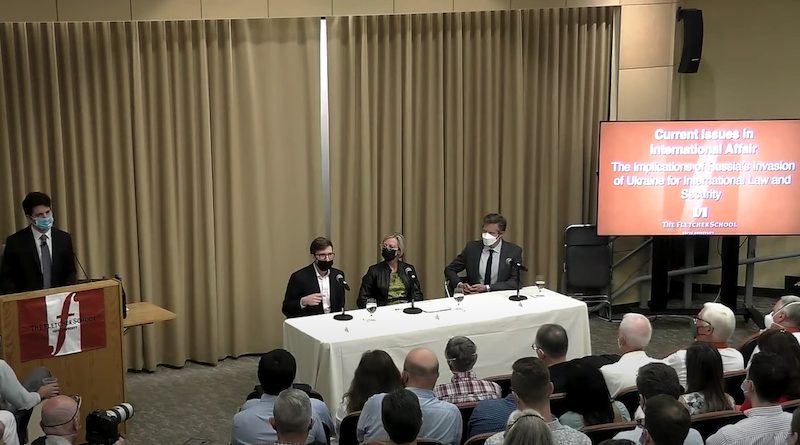The Implications of Russia’s Invasion of Ukraine on International Law and Security
By Alex Thomas, MALD 2023 Candidate, The Fletcher School
On May 21, 2022, the Russia and Eurasia Program at The Fletcher School hosted a panel discussion surrounding the implications of Russia’s invasion of Ukraine on international law and security as part of the Alumni Reunion Weekend. The panel included three professors from the Fletcher School: Dr. Chris Miller, Director of the Russia and Eurasia Program at The Fletcher School and Associate Professor of International History; Tom Dannenbaum, Associate Professor of International Law; and Abigail Linnington, Professor of Practice in The Fletcher School’s International Security Program. It was moderated by Arik Burakovsky, Assistant Director of the Fletcher Russia and Eurasia Program.
The panel discussion began with a brief introduction from Mr. Burakovsky, which covered the origins of the war in 2014 with Russia’s annexation of Crimea and several other drivers, such as the fraught historical relations between Russia and Ukraine, Russia’s security dilemma with NATO, and the Western-trending stance of Ukraine.
After the introduction, Mr. Burakovsky asked each of the panelists questions. He first asked Dr. Miller about the extent to which Vladimir Putin is a strategic or opportunistic leader, as well as how the aims of Russia, Ukraine, and the West have evolved in the last three months of the war.
“Answering the question about whether Vladimir Putin is strategic or opportunistic is challenging, especially given the fact that the war in Ukraine is going very differently than how the Russians intended for it to go,” Dr. Miller responded.
Miller further stated, “When you look at what the Russians thought would happen in Ukraine, it is a very sensible and strategic decision, if their assumptions were less—assumptions that we now know were wrong. After spending a decade spinning propagandistic tales about divisions within Ukrainian society, they began to believe them themselves. It’s not a uniquely Russian trait to misread your neighbors, but I do believe that this is what happened.”
Mr. Burakovsky then turned the conversation to the Western security perspective by asking Professor Linnington about the role of Western intelligence in the war. He specifically asked about why most Western analysts underestimated Ukraine and overestimated Russia prior to the invasion, as well as the effectiveness of intelligence sharing in improving Ukraine’s ability to resist Russia in the war.
“As Zelenskyy entered his third year as president, I think from the defense sector perspective, there was still concern over deep levels of corruption in the Ukrainian government and the progress Zelenskyy had made on his anti-corruption platform, particularly concerning the security assistance program,” Professor Linnington replied.
“Shifting to the Russian capabilities and our overestimations, there has been a continuous debate on the issue between military and civil leaders for quite some time now. This was on display when Russia went into Georgia in 2008, and what we see now are three key areas in which Russia has demonstrated its ineffectiveness: the first is small-unit leadership and the fact that Russia has sent a large number of its senior military leaders to the front line. The second is the lack of combined arms preparation and training, with part of the problem stemming from the fact that most of Russia’s training exercises were scripted and not with a live or thinking adversary. The third is rampant corruption in the Russian military.”
After this, Mr. Burakovsky then asked Professor Dannenbaum about the implications of the war on the field of international law, particularly in the areas of the law on the use of force, international humanitarian law, international criminal law, and international human rights law.
“We are obviously at a very pivotal moment and trajectory in international law as a result of this conflict. The last 86 days have produced a frankly stunning number of violations of the law of armed conflict, including war crimes, crimes against humanity, and possibly genocide. In fact, almost every law in the book has been violated. When this is done by a member of the Security Council with the power to veto it’s particularly concerning,” said Professor Dannenbaum.

